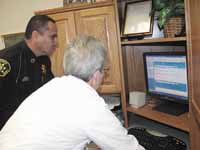| Victim advocate Deborah Kobe and Carbon County Sheriff James Cordova sort through the options on the Victim Information and Notification Everyday website. Carbon County residents and victims of crime can go online or call 1-877-UT4-VINE to register for automatic offender notification 24 hours a day. |
The effort to bring reparation to Carbon County’s victims of crime has taken a significant step forward.
Utah’s statewide victim information and notification everyday service has played a crucial role in the reparation effort, according to Carbon County Sheriff James Cordova.
Through VINE, an automated system funded by the Utah Office of Crime Victims Reparation, victims and the public can access information on any convicted criminal offender currently in the state correctional system.
The information includes:
�Status of the offender.
If the convicted criminal offender is not in official custody, the date the inmate was released will be given to the people accessing the automated VINE system.
�Location of the convicted criminal offender.
The jail or institutional address of the correctional facility housing the convicted offender and telephone number will be given for inmates currently in custody
�Parole eligibility. The next hearing date will be given, where applicable
�Sentence expiration. The tentative release date will be given, where applicable.
Prior to the development of the system, even in domestic violence cases which make notification mandatory, the sheriff said communication with the victims could fall through the cracks.
Now, victims can access the information via the VINE number at 1-877-UT4-VINE or online at www.vinelink.com by clicking on the map of Utah.
“It’s a great system that was long overdue,” indicated Cordova.
Callers and Internet visitors may also register to have an automatic phone call made whenever there is a significant change in an offender’s status such as release or work release, transfer, death while in custody or even escape.
If there is no answer or the line is busy, the VINE system will continue to call every half hour for 24 hours. VINE will leave a message on an answering machine, but will continue to call every two hours for the remainder of the 24-hour period.
Two telephone numbers can be registered per person to assure that the concerned party is reached. However, if the call is not received within the 24-hour period, written notification will be sent.
“This is definitely a godsend to the victims of crime,” commented the Carbon County sheriff. “It just ensures that notification is made.”
All information provided by the system may be accessed 24 hours per day, seven days a week and remains anonymous.
Live operators are also available for people calling from a rotary phone.
To retrieve the status of an offender currently in the Utah correctional system, users must have the correct spelling of the individual’s legal first and last name.
Once the subject is accessed for the first time, callers or Internet visitors can use the listed offender’s identification number for subsequent visits.
The majority of western states are using the VINE system, with the exception of New Mexico and Wyoming.
If an offender is currently in a different state’s correction system, information can also be accessed on the VINE website or by calling the respective state’s toll-free number.
A complete list of states participating in the VINE program can be accessed online.
Jefferson County, Ky. was the driving force behind the establishment of the VINE system after the murder of resident Mary Byron in 1993. When Byron’s was raped, assaulted and stalked by a former boyfriend, he was arrested and jailed for the crimes. However, when bail was posted and the man was released, neither Byron nor her family were notified. The former boyfriend tracked Byron down a shot her.
As a result, Byron’s family developed the Mary Byron Foundation and the community worked together to develop a system that would notify victims of crimes as to the status of offenders. The VINE system has been in place in Utah since April.
Carbon County residents may also contact Victim Advocate Deborah Kobe at the sheriff’s office for help using the system.

